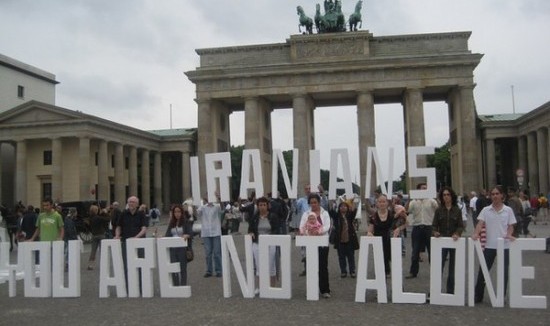Iran is one of the world’s worst violators of religious freedoms, according to a recent report from the United States Commission on International Religious Freedom. The report identifies Iran as a “tier 1 country of particular concern” when it comes to persecuting people of faith.
Already poor religious freedom conditions in Iran continue to deteriorate, particularly for religious minorities, especially Christians, Baha’is, and Sufi Muslims, as well as for dissenting Shi’i and Sunni Muslims. Harassment, arrests, and imprisonment intensified, a trend likely to worsen as the June 2013 presidential election approaches.
American pastor Saeed Abedini was arrested 223 days ago by Iranian autorites for refusing to renounce Christianity. He has been held at Iran’s notorious Evin Prison, known for its harsh conditions and torture dungeons, and was convicted earlier this year and sentenced to 8 years in prison. Abedini celebrates his 33rd birthday today in solitary confinement, where he has been held since April.
“There is a deep piercing pain in my heart knowing that you will spend your birthday in solitary confinement, constrained to a small room, not knowing when it is day or night,” Abedini’s wife said in a statement. “Under constant torture and abuse by radicals who are trying to break you and have you deny your faith in Jesus.”
The report singled out Iran’s Supreme Leader Ayatollah Ali Khamenei and President Mahmoud Ahmedinajad for their cruel treatment of the country’s religious minorities, particularly Christians and Sufi Muslims.
According to the Commission, during the time span covered by the report, “physical attacks, harassment, detention, arrests, and imprisonment intensified. Even some of the recognized non-Muslim religious minorities protected under Iran’s constitution—Jews, Armenian and Assyrian Christians, and Zoroastrians—face harassment, intimidation, discrimination, arrests, and imprisonment.”
Killings, arrests, and physical abuse of detainees have increased, including for religious minorities and Muslims who dissent or express views perceived as threatening the legitimacy of the government. During the reporting period, the government continued to use its religious laws to silence reformers and critics, including women’s rights activists, journalists, and lawyers for exercising their internationally-protected rights to freedom of expression and freedom of thought, conscience, and religion or belief.
“The government of Iran’s increased persecution of religious minorities should raise alarm around the world,” Senator Mark Kirk told an interviewer asking about the issue.
Concerns over Iran’s treatment of its religious minorities were raised following the rigged 2009 elections. In the months leading up to Iran’s June 2013 elections, anticipating turmoil, various arrests have already taken place, detaining reformists, members of the press and government employees.
“As the 2013 Iranian presidential election quickly approaches, many in the religious minority communities brace themselves for the worst,” said Jordan Sekulow, executive director of the American Center for Law and Justice.




